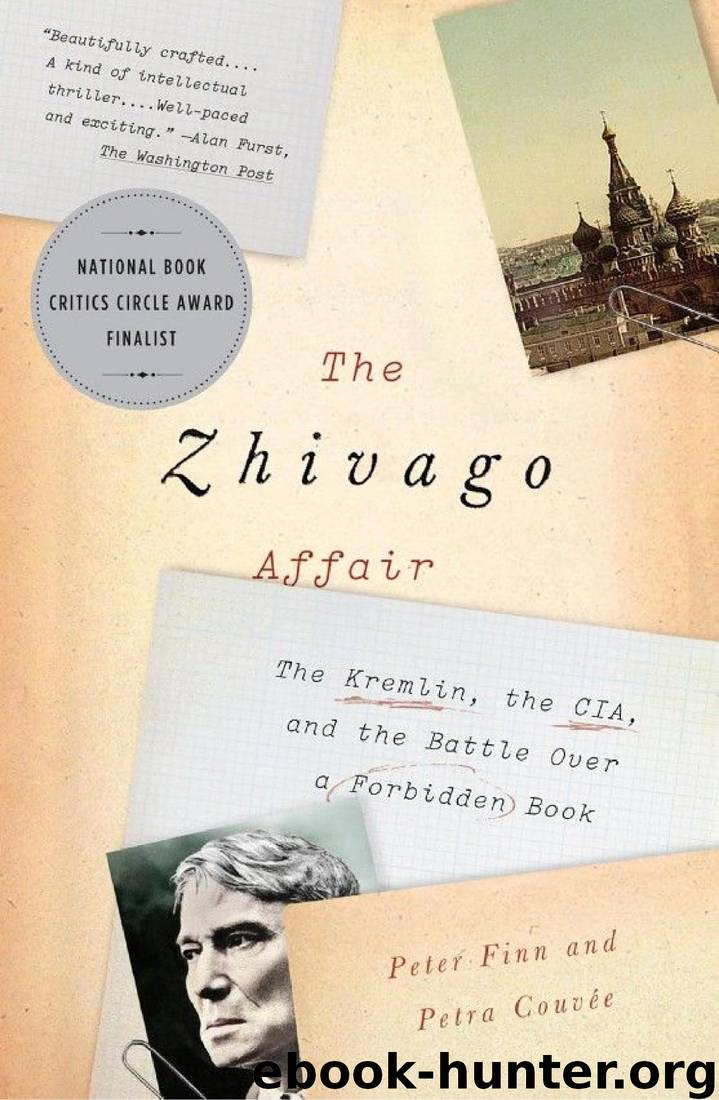The Zhivago Affair: The Kremlin, the CIA, and the Battle Over a Forbidden Book by Peter Finn & Petra Couvée

Author:Peter Finn & Petra Couvée
Language: eng
Format: epub
Tags: Retail, Literary, Biography & Autobiography, Intelligence & Espionage, Russia & the Former Soviet Union, Literary Figures, History, Europe, Nonfiction, Political Science
Publisher: Knopf Doubleday Publishing Group
Published: 2014-06-17T05:02:43+00:00
Irina and a friend brought the letter to the Central Committee building on the Old Square that night. They asked a guard smoking in the shadows of the entryway where they could hand in a letter for Khrushchev.
“Who is it from?” asked the guard.
“Pasternak,” replied Irina.
The guard took the letter.
At noon the following day, the virulence of the offensive reached something of a climax inside Cinema House, a classic piece of constructivist architecture near the writers’ union. About eight hundred writers from the Moscow branch of the union crowded into the main theater to discuss the single agenda item—“the conduct of B. Pasternak.” The meeting was designed to rubber-stamp Pasternak’s expulsion from the Union of Soviet Writers and, in the wake of Semichastny’s speech, echo his call for Pasternak’s expulsion to the West. Attendance was mandatory and the brave simply called in sick. There was already a heaving, moblike atmosphere when Sergei Smirnov opened the meeting. Smirnov spoke at great length and recapped the usual charges against Pasternak: remoteness from the people, the mediocre prose of his shocking novel, and his treachery in colluding with foreigners. “He sent the manuscript to the Italian publisher Feltrinelli, who is a renegade and a deserter from the progressive camp, and you know that there is no worse enemy than the renegade and that the renegade nurses an especially strong hatred for the thing that he has betrayed.” At times Smirnov’s blustering indignation stretched to the almost comic: “A Nobel Prize went to the fascist-inclined French writer Camus, who is very little known in France and who is morally the kind of person that no decent person would ever sit by.”
Murmurs of approval rippled through the crowd and some chorused: “Shame!”
The speech’s defining element was not the outrage but the undercurrents of jealousy and long-standing resentment that surfaced in Smirnov’s mocking tone and his attempt to imitate Pasternak’s way of talking. The myth of Pasternak was fostered by his small group of friends, Smirnov said, and it was one “of an entirely apolitical poet, a child in politics, who understands nothing and is locked away in his castle of ‘pure art’ where he turns out his talented works.… From this coterie, this narrow circle around Pasternak we have heard ‘oohs’ and ‘ahs’ about his talent and his greatness in literature. Let us not hide the fact that there have been people among Pasternak’s friends who have stated at meetings that when Pasternak’s name is spoken, people should stand.”
The meeting ran for five hours, and Smirnov was merely the first of fourteen speakers. And they included some surprising names. When Yevtushenko saw that the poet Boris Slutsky, who had solicited Pasternak’s opinion on his verse earlier that summer, was scheduled to speak, he warned him to be careful, fearing he would defend Pasternak, rile the crowd, and hurt himself.
“Don’t worry,” Slutsky replied. “I shall know how to make my point.”
Slutsky had only recently been admitted to the Union of Soviet Writers, and he felt that his budding career would be ruined if he didn’t speak out against Pasternak.
Download
This site does not store any files on its server. We only index and link to content provided by other sites. Please contact the content providers to delete copyright contents if any and email us, we'll remove relevant links or contents immediately.
| Booksellers & Bookselling | General |
| History of Books |
4 3 2 1: A Novel by Paul Auster(11034)
The handmaid's tale by Margaret Atwood(6837)
Giovanni's Room by James Baldwin(5872)
Big Magic: Creative Living Beyond Fear by Elizabeth Gilbert(4718)
Asking the Right Questions: A Guide to Critical Thinking by M. Neil Browne & Stuart M. Keeley(4566)
On Writing A Memoir of the Craft by Stephen King(4205)
Ego Is the Enemy by Ryan Holiday(3982)
Ken Follett - World without end by Ken Follett(3968)
The Body: A Guide for Occupants by Bill Bryson(3790)
Bluets by Maggie Nelson(3705)
Adulting by Kelly Williams Brown(3663)
Guilty Pleasures by Laurell K Hamilton(3578)
Eat That Frog! by Brian Tracy(3508)
White Noise - A Novel by Don DeLillo(3430)
The Poetry of Pablo Neruda by Pablo Neruda(3358)
Alive: The Story of the Andes Survivors by Piers Paul Read(3303)
The Bookshop by Penelope Fitzgerald(3221)
The Book of Joy by Dalai Lama(3212)
Fingerprints of the Gods by Graham Hancock(3206)
